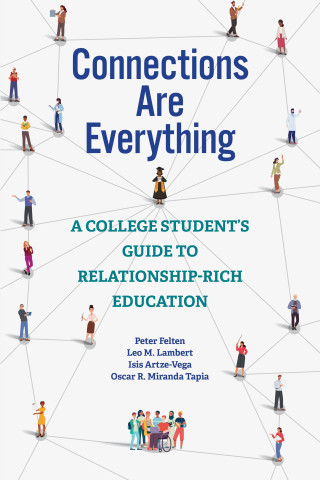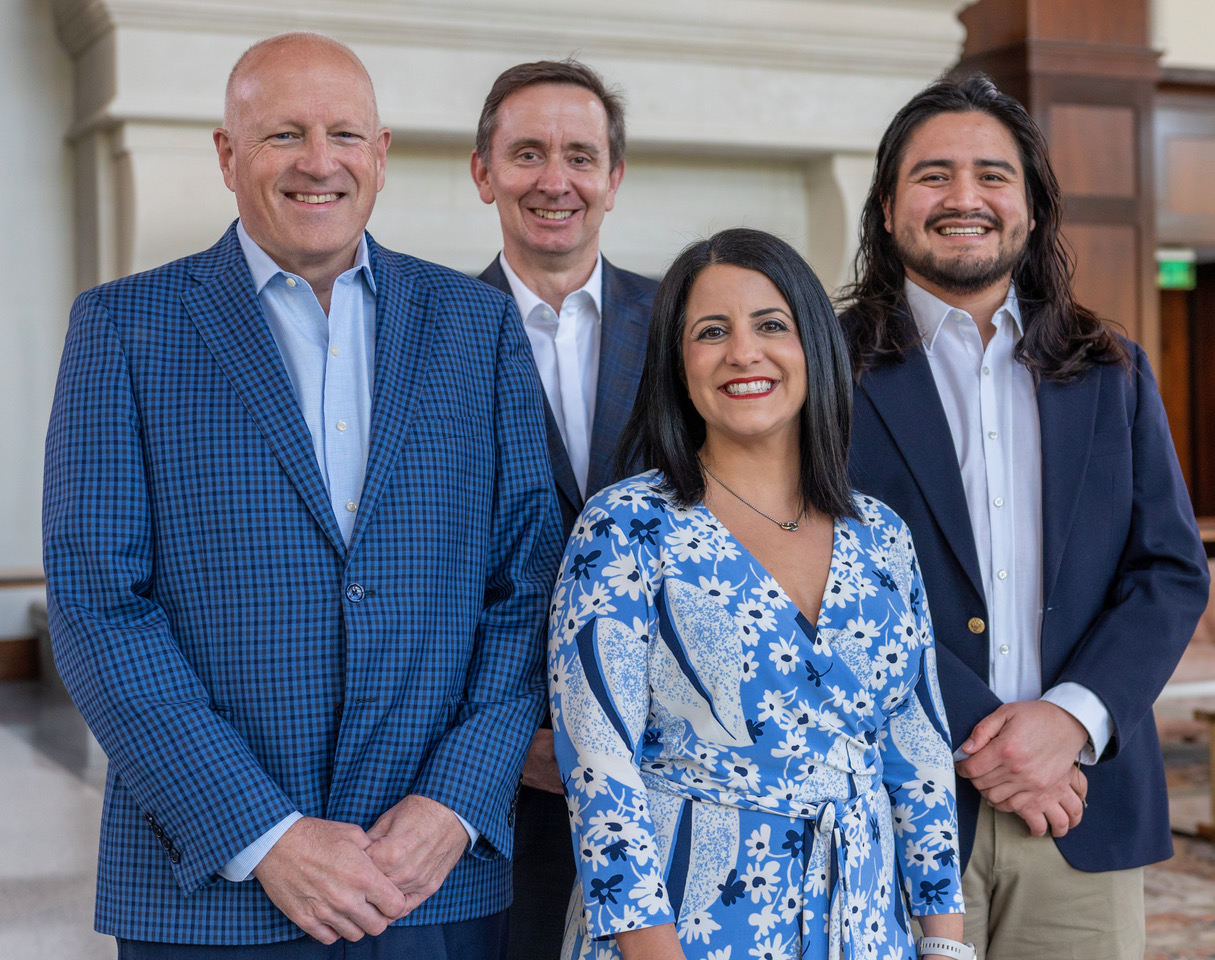With co-authors Isis Artze-Vega and Oscar Miranda Tapia, President Emeritus Leo M. Lambert and Peter Felten, executive director of the Center for Engaged Learning have put together a practical guide for students to rely upon to find and develop powerful relationships during their college experience.
In their book “Relationship-Rich Education,” President Emeritus Leo M. Lambert and Assistant Provost Peter Felten make the case for the transformative power of connections students make with peers, faculty and staff during college. Rooted in insights gained from face-to-face interviews with hundreds of students, the 2020 book lays clear that close relationships can drive the success of students.
 Now joined by new co-authors Isis Artze-Vega and Oscar Miranda Tapia ‘17, the duo has returned with “Connections Are Everything: A College Student’s Guide to Relationship Education,” published this month by Johns Hopkins University Press. If “Relationship-Rich Education” defines and uplifts the destination for faculty and staff, “Connections Are Everything” provides students the map to get there.
Now joined by new co-authors Isis Artze-Vega and Oscar Miranda Tapia ‘17, the duo has returned with “Connections Are Everything: A College Student’s Guide to Relationship Education,” published this month by Johns Hopkins University Press. If “Relationship-Rich Education” defines and uplifts the destination for faculty and staff, “Connections Are Everything” provides students the map to get there.
Based on many 2021 Zoom interviews with students who experienced fruitful and powerful relationships in higher education in a wide variety of forms, the book serves as a practical guide for students who want to seek out empowering connections but may not be sure how to.
“Connections are everything because we need other human beings in our lives,” Lambert said. “Research shows that we learn more, we are happier, we are less anxious when we are in relationship with other people. … If we can help our students understand how important human relationships are to their health, to their wellbeing, to their learning, to their happiness, college will be so much more of a valued and worthwhile experience.”
“Connections Are Everything” is composed of short, practical chapters that students can turn to individually as they approach the critical prospect of connecting to others during their time in college. The book is divided into three parts — Relationships and You, You Never Know Who Will Change You (or How) and You Can Do It.
The first three-chapter section focuses on what students can do to start building connections, how they can approach common challenges college students face and an examination of the strengths that students bring with them as they start pursuing a degree.
The second section looks at the types of people students interact with during their college careers — peers, faculty and staff — and how relationships with those types of individuals can transform their experiences both inside the classroom and out.
The book concludes with a section focused on empowerment. It dives into how “relationship accelerators,” mentoring conversations and constellations of connections can all contribute to deep and meaningful experiences in college and beyond.
Felten, who is also assistant provost and a professor of history, says that he hopes this book can help students have the type of college experience that he had. During his first semester, he had a professor who pulled him aside and challenged him to go beyond the pursuit of good grades to examine who he was and who he was becoming.
“What I hope is that this book helps some students be really alert and awake to those kinds of experiences, and to seek them out,” Felten said. “You start seeing that I can make college experiences really meaningful to me. I can challenge myself and I can grow in ways that I didn’t expect.”
Lambert said that the work on these two books has underscored the reality that so many students, particularly those who may be at the margins, are just one conversation away from leaving college. For instance, first-generation college students haven’t grown up with discussions at the dinner table about attending college, and may have difficulty feeling they don’t belong because that experience is not as familiar to them. They may feel that the rules for success are written in “invisible ink,” Lambert said.
“We tried to write this book so that we could make the invisible visible through student stories,” Lambert said.
Key to the book’s impact is that it draws from the personal lived experiences of a broad range of students who bring their own diverse backgrounds to a variety of higher educational experiences. As they began building the foundation of what would become “Connections Are Everything,” the authors went beyond the ample interviews they completed for “Relationship-Rich Education” and sought out institutions that had embraced the work of helping students build connections.
One of those students is Meena Alizai, a native of Afghanistan who began attending San Antonio College to pursue a nursing degree. She initially felt lost as she grappled with so many challenges new to her as a student in the United States. It was during a visit to the college’s Empowerment Center to pick up diapers for her two young children that she met a staff member there, Bertha Castellanos, who took an interest in her and would become a powerful emotional and intellectual resource for her. “If I didn’t meet Bertha, college wouldn’t be possible for me, because she really helped me during everything,” Alizai told the authors.
Alizai’s unfolding story, which pops up multiple times in the book, is just one of many that populate the work and allow students reading the book to potentially see their own backgrounds and experiences reflected in the guidance they are receiving.
“I hope that students will read this book and read the student stories and think to themselves, OK, I can do this. I may have been a little apprehensive or unsure about what these people meant about relationships and connections,” said Isis Artze-Vega, provost and vice president for academic affairs at Valencia College. “But I hope students leave the book saying, ‘It does sound like relationships will make a big difference. These do seem like steps that I am absolutely capable of taking.’ And they can take those steps and benefit as we always do from more and deeper connections.”
The insights laid out in “Connections Are Everything” are meant to be empowering so that students can see that they have the ability to build relationships themselves. Oscar Miranda Tapia ‘17, who served as assistant director of First-Generation Student Support Services at Elon and is now pursuing his doctorate in education at N.C. State University, notes that developing relationships can be daunting to many students. Realizing what they bring to the table as individuals is important, he said.
“Students certainly bring in a lot of strengths into college, and it’s these strengths that allow them to connect and make these meaningful connections while in college,” Miranda Tapia said.
The goal of the book is to provide a resource that can support students as they build these connections using their own strengths and interests, Felten said. “We didn’t want them to have to rely on anyone else,” he said. “We wanted to make it so that if a student did come upon this book and wanted to read it themselves and put it into action, they could do just that. That’s what we’re seeking to develop in students anyway — the agency and autonomy to be an independent learner.”
Published by Johns Hopkins Press, “Connections Are Everything” is available for sale, but digital copies of the book are being made available to the public for free thanks to support from the John N. Gardner Institute for Excellence in Undergraduate Education.
To enhance the experience for readers, the Center for Engaged Learning has also created a companion site that features interviews with the authors on key aspects of the book as well as guides for each chapter that offer questions for reflection as well as activities to try that support the lessons outlined in the chapter.
Lambert offers his appreciation on behalf of the authors to those who took the time to share their stories of struggle, triumph and connection in a way that allows their experiences to empower students going forward.
“We are so grateful in ‘Connections Are Everything’ for the dozens of students who contributed really authentic stories,” Lambert said. “Students were so great about being authentic and vulnerable and telling us about a fear that they had, or a self-doubt that they had or an apprehension they had, and how one person oftentimes helped them transcend that doubt and land in a much better place. I don’t think there is any better way to talk about those lessons than by students telling their own personal stories.”



